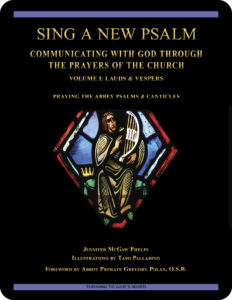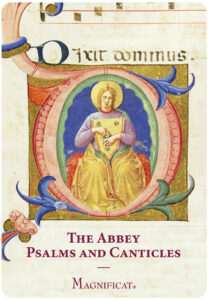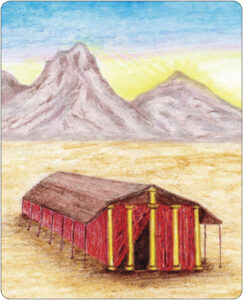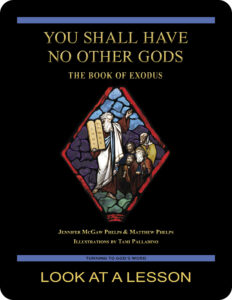 Sing a New Psalm:
Sing a New Psalm:
Communicating with God Through
the Prayers of the Church
Volume I: Lauds & Vespers
Lesson 5 Who May Abide in the LORD’s Tent?
Psalm 11, Psalm 15, Psalm 20, and Psalm 21
Monday Vespers (Week I)
Revised Standard Version Catholic Edition (RSVCE)*
New American Bible Revised Edition (NABRE)*
Catechism of the Catholic Church
ex libris (in our library)
Evangelii Gaudium (Joy of the Gospel)
next lesson: A Soul Athirst for the Living God
This material coordinates with Lesson 5 on pages 22–25 in Sing a New Psalm: Communicating with God Through the Prayers of the Church—Volume I: Lauds & Vespers. Our Catholic Bible study is based on The Abbey Psalms and Canticles, an English translation of the Psalms prepared by the monks at Conception Abbey in 2010 and first published as The Revised Grail Psalms. The Abbey Psalms and Canticles is a revision of that work, finished in 2020 and published by the United States Conference of Catholic Bishops (USCCB). Wording and numbering of some Psalms and verses in other translations may differ. This new translation of the Psalms in the process of being added to all English-language Liturgy of the Hours books used in the United States. The USCCB also plans a liturgical Bible based on the NABRE translation.
The Abbey Psalms and Canticles, an English translation of the Psalms prepared by the monks at Conception Abbey in 2010 and first published as The Revised Grail Psalms. The Abbey Psalms and Canticles is a revision of that work, finished in 2020 and published by the United States Conference of Catholic Bishops (USCCB). Wording and numbering of some Psalms and verses in other translations may differ. This new translation of the Psalms in the process of being added to all English-language Liturgy of the Hours books used in the United States. The USCCB also plans a liturgical Bible based on the NABRE translation.
“Unlike other prayers in sacred Scripture, the prayers contained in the Psalms are not inserted into a narrative story that specifies their meaning and function. Instead, the Psalms are given to the believer precisely as a text of prayer. Since they are the Word of God, the believer who prays the Psalms speaks to God using the very words that God himself has given to us. Thus, in praying the Psalms we learn to pray. The Psalms are a school of prayer.”—Pope Benedict XVI
welcome to our in-depth study of the Psalms
We invite groups and individuals to check out the sample first lesson from this 28- lesson Turning to
lesson Turning to  God’s Word Catholic Bible study. Our online study pages include additional questions, commentary, and prayers based on the Psalm texts. Sing a New Psalm: Communicating with God Through the Prayers of the Church—Volume I: Lauds & Vespers has been granted an imprimatur. A digital version of this study can be purchased from our website shop. Volume II: Vigils, Day Prayer & Compline is scheduled for publication in 2025. If you have a Bible-related question or comment, click on one of the “ask us your question” or “what do you think” buttons on any online study page.
God’s Word Catholic Bible study. Our online study pages include additional questions, commentary, and prayers based on the Psalm texts. Sing a New Psalm: Communicating with God Through the Prayers of the Church—Volume I: Lauds & Vespers has been granted an imprimatur. A digital version of this study can be purchased from our website shop. Volume II: Vigils, Day Prayer & Compline is scheduled for publication in 2025. If you have a Bible-related question or comment, click on one of the “ask us your question” or “what do you think” buttons on any online study page.
open with prayer
It’s always wise to begin any Bible study with prayer, whether reading the Scriptures alone or meeting with others in a discussion study group. You can pray using your own words, pray one of the Psalms in this lesson, or use one of the opening prayers on our website. We especially like the following:
Lord Jesus, you promised to send your Holy Spirit
to teach us all things.
As we read and study your word today,
allow it to touch our hearts and change our lives. Amen.
an examination of conscience
 “Who May Abide in the LORD’s Tent?” is the question asked in Psalm 15. This illustration by Turning to God’s Word co-founder Tami Palladino shows the LORD’s tent in the wilderness. The descendants of Jacob understood that it was necessary for people to undergo a purification process before entering into a holy place. In Psalm 15, the Psalmist lists 11 requirements for individuals of his own time who wished to approach God’s dwelling place. Thousands of years later, the same list still is worth consideration by Christians, for whom it can serve as a useful examination before we approach God in the sacrament of Reconciliation. Click on Tami’s illustration (right) to enlarge it. Her original illustration is on page 23 in Sing a New Psalm: Communicating with God Through the Prayers of the Church—Volume I: Lauds & Vespers.
“Who May Abide in the LORD’s Tent?” is the question asked in Psalm 15. This illustration by Turning to God’s Word co-founder Tami Palladino shows the LORD’s tent in the wilderness. The descendants of Jacob understood that it was necessary for people to undergo a purification process before entering into a holy place. In Psalm 15, the Psalmist lists 11 requirements for individuals of his own time who wished to approach God’s dwelling place. Thousands of years later, the same list still is worth consideration by Christians, for whom it can serve as a useful examination before we approach God in the sacrament of Reconciliation. Click on Tami’s illustration (right) to enlarge it. Her original illustration is on page 23 in Sing a New Psalm: Communicating with God Through the Prayers of the Church—Volume I: Lauds & Vespers.
 conscience—you could look it up in our archives
conscience—you could look it up in our archives
The concept of a conscience seems fairly basic to Christianity. To learn more about how the early Christians viewed conscience as an externally defined view of right and wrong, read Lost in Translation, an online column in which Turning to God’s Word author Matthew Phelps helps readers connect with ideas expressed in the original languages of the Scriptures. New Lost in Translation entries are posted on Mondays, and past entries are archived on our website. Contact us if you’d like to receive Lost in Translation by email every week.
read the Catechism—the three conditions that must be met for sin to be mortal
 The section of the Catechism of the Catholic Church that deals with the gravity of sin explains Church teaching regarding mortal and venial sins. Mortal sin is a grave violation of God’s law. A clear understanding of the conditions that must be met for a sin to be mortal can help us when we’re faced with certain difficult moral decisions. Paragraph 1857 in the Catechism of the Catholic Church lists those three conditions, which are described in more detail in paragraphs 1858 through 1861.
The section of the Catechism of the Catholic Church that deals with the gravity of sin explains Church teaching regarding mortal and venial sins. Mortal sin is a grave violation of God’s law. A clear understanding of the conditions that must be met for a sin to be mortal can help us when we’re faced with certain difficult moral decisions. Paragraph 1857 in the Catechism of the Catholic Church lists those three conditions, which are described in more detail in paragraphs 1858 through 1861.
1857 For a sin to be mortal, three conditions must together be met: “Mortal sin is sin whose object is grave matter and which is also committed with full knowledge and deliberate consent.”
read the Catechism—how well do you know your faith?
What do you know about the threat of mortal sin, and how familiar are you with the conditions that  cause sin to endanger our immortal souls? Can you answer the following question without looking at the Catechism of the Catholic Church?
cause sin to endanger our immortal souls? Can you answer the following question without looking at the Catechism of the Catholic Church?
How would you define and describe the three conditions necessary for mortal sin to a friend who asked? To learn what the Church teaches, refer to paragraphs 1858 through 1861 in the Catechism of the Catholic Church.
 1858 Grave matter is specified by the Ten Commandments, corresponding to the answer of Jesus to the rich young man: “Do not kill, Do not commit adultery, Do not steal, Do not bear false witness, Do not defraud, Honor your father and your mother.” The gravity of sins is more or less great: Murder is graver than theft. One must also take into account who is wronged: violence against parents is in itself graver than violence against a stranger.
1858 Grave matter is specified by the Ten Commandments, corresponding to the answer of Jesus to the rich young man: “Do not kill, Do not commit adultery, Do not steal, Do not bear false witness, Do not defraud, Honor your father and your mother.” The gravity of sins is more or less great: Murder is graver than theft. One must also take into account who is wronged: violence against parents is in itself graver than violence against a stranger.
1859 Mortal sin requires full knowledge and complete consent. It presupposes knowledge of the sinful character of the act, of its opposition to God’s law. It also implies a consent sufficiently deliberate to be a personal choice. Feigned ignorance and hardness of heart do not diminish, but rather increase, the voluntary character of a sin.
1860 Unintentional ignorance can diminish or even remove the imputability of a grave offense. But no one is deemed to be ignorant of the principles of the moral law, which are written in the conscience of every man. The promptings of feelings and passions can also diminish the voluntary and free character of the offense, as can external pressures or pathological disorders. Sin committed through malice, by deliberate choice of evil, is the gravest.
 1861 Mortal sin is a radical possibility of human freedom, as is love itself. It results in the loss of charity and the privation of sanctifying grace, that is, of the state of grace. If it is not redeemed by repentance and God’s forgiveness, it causes exclusion from Christ’s kingdom and the eternal death of hell, for our freedom has the power to make choices for ever, with no turning back. However, although we can judge that an act is in itself a grave offense, we must entrust judgment of persons to the justice and mercy of God.
1861 Mortal sin is a radical possibility of human freedom, as is love itself. It results in the loss of charity and the privation of sanctifying grace, that is, of the state of grace. If it is not redeemed by repentance and God’s forgiveness, it causes exclusion from Christ’s kingdom and the eternal death of hell, for our freedom has the power to make choices for ever, with no turning back. However, although we can judge that an act is in itself a grave offense, we must entrust judgment of persons to the justice and mercy of God.
 the popes inspire us—reverence for the truth
the popes inspire us—reverence for the truth
Turning to God’s Word co-founder Tami Palladino suggests that Evangelii Gaudium (Joy of the Gospel), an apostolic exhortation by Pope Francis, is helpful for those embarking on Bible study. You can read the Pope’s papal document online. The Holy Father urges Catholics to have patience when engaging in Scripture study. Find links to this and other magisterial documents that have been cited in Turning to God’s Word studies at ex libris—magisterial documents.
what does your king desire?
Psalm 20 and Psalm 21 deal with the desires of the king’s heart, raising several questions. Whom do you consider the ruler over your life, and how is this reflected in your behavior? What does the Psalmist see as the thing that his king most desires? A logical initial supposition might be that any king would desire victory over his enemies and the ability to reign in peace. What other possibilities come to your mind?
WHAT DO YOU THINK are the most important desires of your heart?
Thinking about the desires of the king’s heart leads fairly naturally to thinking about the desires of our own hearts.
 ? How might these Psalms have been prayed by Jesus?
? How might these Psalms have been prayed by Jesus?
? What do we think it is that Jesus, our eternal king, most desires in his heart?
? What is it that you think present-day Christians most desire?
? What is it that you personally hold as your greatest desire?
? Consider whether your answer resembles what God might most desire.
? In what way does your answer differ?
? What can you point to in your life as evidence that your desires are in line with your Christian faith?
 the popes inspire us—an ancient question
the popes inspire us—an ancient question
“Splendor of Divine Light” on page 25 in Sing a New Psalm: Communicating with God Through the Prayers of the Church—Volume I: Lauds & Vesper addresses the confusing issue of whom the Psalmist might have been referring to as God’s Son in Psalm 2:7. In this brief commentary, Pope St. John Paul II gives his answer: The sovereign (prince or king) is a “son” of God in a metaphorical and adoptive sense as a lieutenant of the LORD safeguarding justice.
military images
Psalm 20 uses military images to describe God, something not uncommon in Scripture. This is, however, a somewhat dangerous assumption if we attempt to carry this idea with us into every conflict we face. To learn more about the connection between this Old Testament idea and New Testament fulfillment of prophecy, read “God as a Warrior” on page 24 in Sing a New Psalm: Communicating with God Through the Prayers of the Church—Volume I: Lauds & Vesper.
read the Catechism—how well do you understand prayers of petition & supplication?
It’s easy to focus on ourselves and our needs, and to overlook the fundamental attitude we should take when asking God to do something for us. Paragraphs 2631–2633 in the Catechism of the Catholic Church explain the basics.
2631 The first movement of the prayer of petition is asking forgiveness, like the tax collector in the parable: “God, be merciful to me, a sinner!” It is a prerequisite for righteous and pure prayer. A trusting humility brings us back into the light of communion between the Father and his Son Jesus Christ and with one another, so that “we receive from him whatever we ask.” Asking forgiveness is the prerequisite for both the liturgy and personal prayer.
the Father and his Son Jesus Christ and with one another, so that “we receive from him whatever we ask.” Asking forgiveness is the prerequisite for both the liturgy and personal prayer.
2632 Christian petition is centered on the desire and search for the Kingdom to come, in keeping with the teaching of Christ. There is a hierarchy in these petitions: we pray first for the Kingdom, then for what is necessary to welcome it and cooperate with its coming. This collaboration with the mission of Christ and the Holy Spirit, which is now that of the Church, is the object of the prayer of the apostolic community. It is the prayer of Paul, the apostle par excellence, which reveals to us how the divine solicitude for all the churches ought to inspire Christian prayer. By prayer every baptized person works for the coming of the Kingdom.
2633 When we share in God’s saving love, we understand that every need can become the object of petition. Christ, who assumed all things in order to redeem all things, is glorified by what we ask the Father in his name. It is with this confidence that St. James and St. Paul exhort us to pray at all times.
Psalm 20—an uplifting prayer of petition
Although Psalm 20 originally was written as a prayer for a king, the second through sixth verses are extremely well-suited as a prayer of petition for others who’ve specifically asked us to pray on their behalf. Whom do you know who needs your prayers today and could benefit if you pray Psalm 20 while keeping them and their particular situation in mind?
the best Catholic commentary about Scripture
 To find out more about how Church teaching is supported by passages in Sing a New Psalm: Communicating with God Through the Prayers of the Church—Volume I: Lauds & Vespers, check out the Index of Citations in the Catechism of the Catholic Church. Links to the primary Scripture passages in the lesson (Revised Standard Version Catholic Edition [RSVCE*]) and relevant paragraphs in the Catechism are provided here. Not every passage in the biblical text for this study is referenced in a Catechism paragraph, however, including Psalm 11, Psalm 15, Psalm 20, and Psalm 21 in this lesson.
To find out more about how Church teaching is supported by passages in Sing a New Psalm: Communicating with God Through the Prayers of the Church—Volume I: Lauds & Vespers, check out the Index of Citations in the Catechism of the Catholic Church. Links to the primary Scripture passages in the lesson (Revised Standard Version Catholic Edition [RSVCE*]) and relevant paragraphs in the Catechism are provided here. Not every passage in the biblical text for this study is referenced in a Catechism paragraph, however, including Psalm 11, Psalm 15, Psalm 20, and Psalm 21 in this lesson.
don’t forget about our indexes & extra online material

 If you’re trying to locate information about a specific Scripture passage, you can look it up in the index at the back of the study book or sample lesson. If you want to find a particular commentary, you can look up its title in the topics index. To learn more about another book of the Bible for which there’s a Turning to God’s Word study, visit the online study directories to read the commentaries and watch any accompanying videos. Finally, if you have a question or would like to make a comment about any of our studies, you can use one of the “ask us your question” or “what do you think” buttons to email our authors.
If you’re trying to locate information about a specific Scripture passage, you can look it up in the index at the back of the study book or sample lesson. If you want to find a particular commentary, you can look up its title in the topics index. To learn more about another book of the Bible for which there’s a Turning to God’s Word study, visit the online study directories to read the commentaries and watch any accompanying videos. Finally, if you have a question or would like to make a comment about any of our studies, you can use one of the “ask us your question” or “what do you think” buttons to email our authors.
ex libris—Church documents & books about religious topics
Link to magisterial documents referred to in our Bible studies at ex libris—magisterial documents.  This listing includes significant recent encyclicals as well as a number of historical Church documents. Recommended books related to Scripture study can be found at ex libris—main bookshelf.
This listing includes significant recent encyclicals as well as a number of historical Church documents. Recommended books related to Scripture study can be found at ex libris—main bookshelf.
wondering how to pronounce some of these words?
The following links are to readings from the New International Version (NIV) Bible. To listen, open one of the links and click on the audio icon above the printed text. Although not taken from the translations used in our study materials, the NIV readings provide an audio guide to pronunciation of words in this lesson’s primary biblical texts. A close online version of the translation of the Bible used in Catholic liturgy in the United States as well as an audio guide for daily Mass readings for the current month can be found on the website of the United States Conference of Catholic Bishops (USCCB).
Psalm 11 (NIV)
Psalm 15 (NIV)
Psalm 20 (NIV)
Psalm 21 (NIV)
 close with a Psalms-based prayer for Monday Vespers (Week I)
close with a Psalms-based prayer for Monday Vespers (Week I)
Many of our Catholic study groups like to conclude their discussions with a prayer based on the scriptural focus of their lesson. If you’re uncomfortable composing your own Bible-based prayers, you can follow our four easy steps. If you prefer, you can pray any of the Psalms in this lesson, or you can use the following short prayer.
O God, you chose to dwell with your people in a tent
when they sojourned in the wilderness.
Give us the grace to walk without fault,
do what is just, and speak the truth
that we may provide within our hearts
a proper dwelling place for your Holy Spirit.
We ask this in the name of your Son, Jesus Christ,
who out of love sent the Spirit to be our Counselor. Amen.
Lesson 6 A Soul Athirst for the Living God, Tuesday Lauds (Week I)—Psalm 42, Psalm 43, and Psalm 30
Lesson 4 To My Words Give Ear, O LORD, Monday Lauds (Week I)—Psalm 5, and Psalm 19
you also may like our study of the book of Exodus
 You Shall Have No Other Gods: The Book of Exodus, a 28-lesson Catholic Bible study with an imprimatur, provides an in-depth look at how significant events in biblical history that occurred thousands of years ago to descendants of Jacob remain relevant and even critical for present-day Christians to understand. The deliverance of the Hebrews from slavery in Egypt and the giving of Ten Commandments are examined along with the development of Moses’ relationship to God. Click on the book’s cover to view a sample lesson.
You Shall Have No Other Gods: The Book of Exodus, a 28-lesson Catholic Bible study with an imprimatur, provides an in-depth look at how significant events in biblical history that occurred thousands of years ago to descendants of Jacob remain relevant and even critical for present-day Christians to understand. The deliverance of the Hebrews from slavery in Egypt and the giving of Ten Commandments are examined along with the development of Moses’ relationship to God. Click on the book’s cover to view a sample lesson.
start a Turning to God’s Word Bible study
Thank you for your interest in Sing a New Psalm: Communicating with God Through the Prayers of the Church—Volume I: Lauds & Vespers. 
 More information about beginning a Turning to God’s Word Bible study can be found on this website at start a Bible study, and Tami, Matthew, and I are available to answer questions or discuss concerns. Contact us to start this or one of our other studies or to have your schedule listed with other TtGW study groups on our website. —Jennifer
More information about beginning a Turning to God’s Word Bible study can be found on this website at start a Bible study, and Tami, Matthew, and I are available to answer questions or discuss concerns. Contact us to start this or one of our other studies or to have your schedule listed with other TtGW study groups on our website. —Jennifer
*There are seven deuterocanonical books in the Old Testament—the Books of Tobit, Judith, Wisdom, Sirach, Baruch, and First and Second Maccabees, as well as some passages in the Books of Esther and Daniel. Protestants usually refer to these works as “apocryphal,” a word that means “outside the (Protestant) canon” because they’re excluded from most Protestant Bibles. The word “deuterocanonical” means “second canon”; Catholics use that word to refer to any section of the Catholic Old Testament for which there are no extant, or existing, Hebrew manuscripts. All of the deuterocanonical books appear in the Septuagint, the earliest remaining versions of which date to the 1st century B.C. This Greek translation of the Old Testament was in common use by Jews at the time of Jesus. Learn more by reading How Do Catholic & Protestant Bibles Differ?
Turning to God’s Word printed Bible studies use the 2006 Revised Standard Version Second Catholic Edition (RSV2CE) translation for all Scripture references except the Psalms, which are taken from The Abbey Psalms and Canticles, prepared by the monks of Conception Abbey and published in 2020 by the United States Conference of Catholic Bishops (USCCB). All Scripture links for the online study pages for Sing a New Psalm: Communicating with God Through the Prayers of the Church—Volume I: Lauds & Vespers are to the 1966 Revised Standard Version Catholic Edition (RSVCE) translation. The New International Version (NIV) audio recordings follow the same chapter and verse numbering as the RSV Catholic translations, but the NIV doesn’t include the deuterocanonical passages.
The 1966 RSVCE uses archaic pronouns and verb forms such as “thee,” “thou,” “didst” in the Psalms and in direct quotations attributed to God. The 2006 RSV2CE replaces these with more accessible English. The few significant translation changes in the RSV2CE include rendering almah as “virgin” in the Book of Isaiah 7:14 and restoring the term “begotten” in the Gospel According to John 3:16.
The Psalms in this Bible study reflect numbering used in The Abbey Psalms and Canticles; Psalms numbering may vary in other translations. Numbering also may vary for a few other passages in this Bible study. Turning to God’s Word studies follow the numbering in the Revised Standard Version Catholic translations (RSVCE and RSV2CE). Discrepancies in the New American Bible Revised Edition (NABRE) are noted in the Index of Scripture Citations in the study book and the online sample.
 The companion to this Catholic Bible study from Turning to God’s Word, Sing a New Psalm: Communicating with God Through the Prayers of the Church—Volume II: Vigils, Day Prayer & Compline, will cover Psalms not included in Volume I: Lauds & Vespers. Volume II: Vigils, Day Prayer & Compline is scheduled for publication in 2025.
The companion to this Catholic Bible study from Turning to God’s Word, Sing a New Psalm: Communicating with God Through the Prayers of the Church—Volume II: Vigils, Day Prayer & Compline, will cover Psalms not included in Volume I: Lauds & Vespers. Volume II: Vigils, Day Prayer & Compline is scheduled for publication in 2025.
